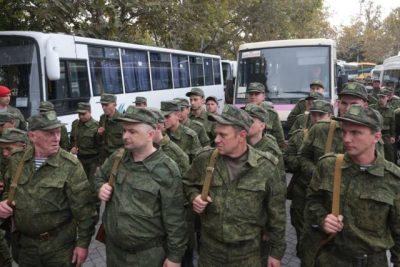Young Ukrainians “Refuse to Fight”: “Very Old” Soldiers Are Being Recruited, They Constitute “A Majority” in Ukrainian Army
"The Country is unable to Continue Fighting".

All Global Research articles can be read in 51 languages by activating the Translate Website button below the author’s name (only available in desktop version).
To receive Global Research’s Daily Newsletter (selected articles), click here.
Click the share button above to email/forward this article to your friends and colleagues. Follow us on Instagram and Twitter and subscribe to our Telegram Channel. Feel free to repost and share widely Global Research articles.
New Year Donation Drive: Global Research Is Committed to the “Unspoken Truth”
***
Ukraine’s mobilization problems are increasingly clear. The country no longer has enough young citizens to continue fighting, which is why it is calling on the older population. Currently, according to local officials, the average age of Kiev’s fighters is over 40 years old, which shows how the country is weakened and unable to continue fighting in the long term.
In a recent interview with Espresso TV, Aleksey Tarasenko, commander of the 5th Kiev Assault Brigade, admitted the critical data about the average age of Ukrainian soldiers. He stated that it is urgent to carry out new mobilization campaigns in order to enlist younger people, as there are a series of “problems” in recruiting old men.
“The military is eagerly awaiting fresh reinforcements because the situation in many units is critical in terms of personnel (…) Even those who do come often leave much to be desired. Mostly, these are men of a much older age with a multitude of problems that typically arise”, he told journalists.
According to Tarasenko, most of the previously recruited young Ukrainians are already “gone.” His arguments and data endorse the wing of the Ukrainian parliament that wants not only to call for a new total mobilization, but also to harden punishment for those who avoid conscription. The objective is to expand the number of young soldiers in order to refresh troops weakened after two years of intense frictions.
In December, President Vladimir Zelensky revealed a plan to call up 500,000 new troops. However, according to the governor of Nikolaev, Valery Kim, this number would also be insufficient, and there would be a need to recruit at least 2 million new soldiers for there to be any real change in favor of Ukraine on the battlefield.
In fact, the numbers seem unrealistic. Ukraine is unable to carry out new major mobilization campaigns because it has already lost more than 500,000 troops on the front lines. The Ukrainians who have not yet been mobilized are basically what is left in the country to occupy all the non-military roles – if they are called up, there will be a crisis in several sectors of Ukrainian civil society.
There is an effort by the country to resolve this problem through the repatriation of Ukrainians who fled abroad, but this is a complicated task. People fleeing wars are considered refugees, not mere migrants, according to international law, which makes it illegal for host countries to return these citizens to their homeland. Ukraine is unlikely to reach an agreement with Western countries on the topic, hoping only that the allied states will advise Ukrainians to voluntarily return to their nation.
All these facts create a kind of impasse for Kiev. The country is unable to continue fighting. What remains to send to the front lines are virtually only old men, women, teenagers and people with serious health issues. The majority of the young male population has already been decimated or fled the country, with a serious demographic problem caused by Kiev’s decision to take the war to its ultimate consequences.
The Ukrainian government, however, is not truly responsible for deciding whether to continue fighting or not. The regime’s sponsors have made it clear from the beginning that the war must continue until the last Ukrainian. Even now, when aid is beginning to decline due to increasing US attention to Israel, there does not appear to be an “authorization” for Kiev to stop fighting. Indeed, the neo-Nazi regime has agreed to work as a proxy for an alliance that is not concerned with the well-being and future of the Ukrainian people – and that does not have objections about annihilating the Ukrainian population just to try to “wear down” Russia.
Furthermore, it is necessary to remember that even if Ukraine manages to improve its recruiting numbers and send more troops to the battlefield, this will certainly not have any real impact on the final outcome of the conflict. The Russians continue to fight with only a small percentage of their real military capacity, with Moscow having abundant mobilization capacity. If Kiev increases the number of troops on the ground, Moscow will be able to call up more reservists and will have enough troops to carry out as many mobilizations as necessary – while Ukraine is more and more demographically incapable of carrying out new enlistments.
So, in the end, Ukraine only has two options left: continue on its suicidal path and cause even more irreversible damage to its own population, or act sovereignly, break with the West and accept Russian peace terms.
*
Note to readers: Please click the share button above. Follow us on Instagram and Twitter and subscribe to our Telegram Channel. Feel free to repost and share widely Global Research articles.
This article was originally published on InfoBrics.
Lucas Leiroz is a journalist, researcher at the Center for Geostrategic Studies, geopolitical consultant. You can follow Lucas on X (former Twitter) and Telegram. He is a regular contributor to Global Research.
Featured image source

